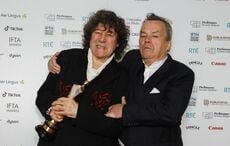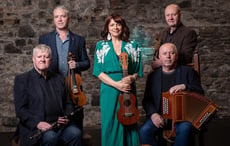U2’s new album ‘Songs of Innocence’ takes its inspiration from 1970s Dublin and as Bono describes, his family and teenage years. The U2 frontman spoke to the Irish Times about the new album and its influences.
“Life begins with the first glance, the first kiss at the first dance, all of us are wondering why we’re here, in the Crystal Ballroom underneath the chandelier . . . We are the ghosts of love and we haunt this place, in the ballroom of crystal lights, everyone is here with me tonight, everyone but you.”
“I need to tell you something really weird about this song,” Bono told the Irish Times. “It’s called The Crystal Ballroom, which used to be the name of McGonagles in South Anne Street [now knocked down]. A whole generation of Dubliners would go to the Crystal Ballroom for dances, and many couples first met there. My mother and father used to dance together in the Crystal Ballroom, so that song I just sang you, which hasn’t been released yet, is me imagining I’m on the stage of McGonagles with this new band I’m in called U2 – and we did play a lot of our important early gigs there. And I look out into the audience and I see my mother and father dancing romantically together to U2 on the stage.”
“I have just realised that my mother died 40 years ago yesterday, and here we are today playing our new album about Dublin, which is about my family and what happened to me as a teenager.
“My mother died when she was at her father’s funeral. She had a cerebral aneurysm. I was only 14. And in this song I am singing, “Everyone is here tonight, everyone but you.” And it’s me wanting to see my mother dance again in the Crystal Ballroom and for her to see what happened to her son.”
In the song “Iris (Hold Me Close)” Bono sings about his mother’s untimely death.
“The ache in my heart is so much a part of who I am . . . Hold me close and don’t let me go . . . I’ve got your life inside of me . . . We’re meeting up again.”
“I sing this verse which has ‘Iris standing in the hall, she tells me I can do it all,’ and then there’s a typical mother’s line when she says to me, ‘You’ll be the death of me.’ But it wasn’t me. I wasn’t the death of her. I was not the death of her,” says U2’s frontman.
“The mother is so, so important in rock music. Show me a great singer and I’ll show you someone who lost their mother early on. There’s Paul McCartney, there’s John Lennon. Look at Bob Geldof and what happened to his mother. In hip hop, by contrast, it’s all about the father – being abandoned by the father and being brought up by a single mother. But for me it’s all about the mother. I had rage and grief for my mother. I still have rage and grief for my mother. I channelled those emotions in music, and I still do. I have very few memories of my mother, but all of them are in the song Iris.”
As a young teenager, Bono, who back then was just Paul Hewson, had strained relationships with his older brother Norman and his father after his mother’s death. Growing up on Cedarwood Road, in Glasnevin, in north Dublin, Bono would knock on the doors of his neighbors the Rowens at lunchtime and the Hanveys for teatime.
Derek Rowen would go on to become the artist Guggi. Fionán Hanvey would become the musician Gavin Friday, of the Virgin Prunes, the Irish Times reports.
The new song ‘Cedarwood Road’ describes the cherry blossom tree in the Rowens’ garden.
“I was looking for a soul that’s real. Then I ran into you, and that cherry blossom tree was a gateway to the sun.”
Bono says that in the Dublin suburbs of the 1970s, a cherry blossom tree “seemed to be the most luxurious thing.”
About the new album, he says: “It’s us trying to figure out why we wanted to be in a band in the first place, the relationships around the band and our first journeys – geographically, spiritually and sexually. It was tough and it took years. Put it this way: a lot of sh*t got dragged up.”
The song ‘Raised By Wolves’ remembers the Dublin bombings of 1974.
“The bombs were set to go off at the same time on a Friday evening, at 5.30pm,” says Bono. “At that time on Fridays in 1974 I would have been at the Golden Discs shop in Marlborough Street, just around the corner from where the bombs exploded. But that day I had cycled to school so didn’t get the bus into town afterwards as usual.”
He also recalls the violence and the beating given to the band’s members and their friends in the Virgin Prunes.
“I’m not really talking about the Black Catholics here so much as how we just attracted violence for the way we looked and bands we liked,” he says. “Gavin Friday used to get his head kicked in regularly. But then Gavin’s always had a stupid, big head.
“Then I went a bit further and remembered all the violence meted out to women by their husbands, the beatings children experienced from their fathers and how, at that time particularly, priests were sexually abusing young children.”
Bono says that when he was 17 or 18 he believed he had no hope of ever being in a band. “That was because I sang like a girl. I was never going to make it as a punk-rock singer or a rock-music singer with my girl’s voice,” he says. “But I found my voice through Joey Ramone, hearing his singing at a gig in Dublin. Joey has a sort of girl’s voice as well when he sang – and that was my way in.”
Despite U2’s global success, the self-loathing is still there. “The honest truth here is that I wish we were a better band. I wish we were a more talented band. The reason why this new album didn’t happen for us for so many years is because of this,” Bono says. Says The Edge: “As a band we were always either power or noise. But now U2 have so many grey areas. It’s no longer power, which is good, or noise, which is bad. You’ve got to know when it’s not happening with us, and the most destructive thing here is to almost get it right.”
Bono says: “It’s also the excruciating humility I have to go through these days. The fact that I think we are incapable of greatness. And Jimmy Iovine, a former U2 album producer, said something hard to me. He said, ‘You’re a long way from where you live.’ And that hurt. I live in Dalkey but I’m from Cedarwood Road, and I know what he was saying about me when he used that line. It was really embarrassing for me to hear that. And that is precisely why this album is Dublin-centric.”
U2 has recently helped launch a range of Apple products and 'Songs of Innocence’ is available to iTunes customers. Contrary to reports that U2 gave the album to Apple to distribute free, Bono says the band did receive money for the album.
“We were paid,” he says. “I don’t believe in free music. Music is a sacrament.”
A sister album to 'Songs of Innocence,' called 'Song of Experience' will be released soon.
“Over the next while we will be collaborating with Apple on some cool stuff, and Songs of Experience should be ready soon enough. I know I’ve said that before,” revealed Bono.




Comments